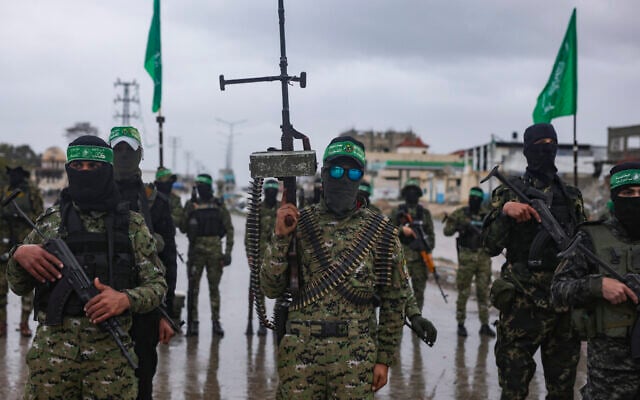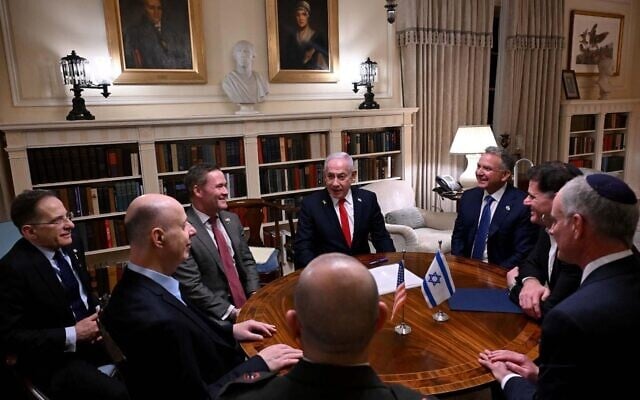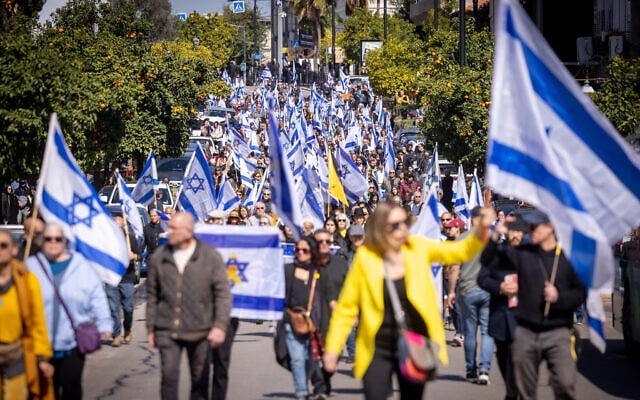


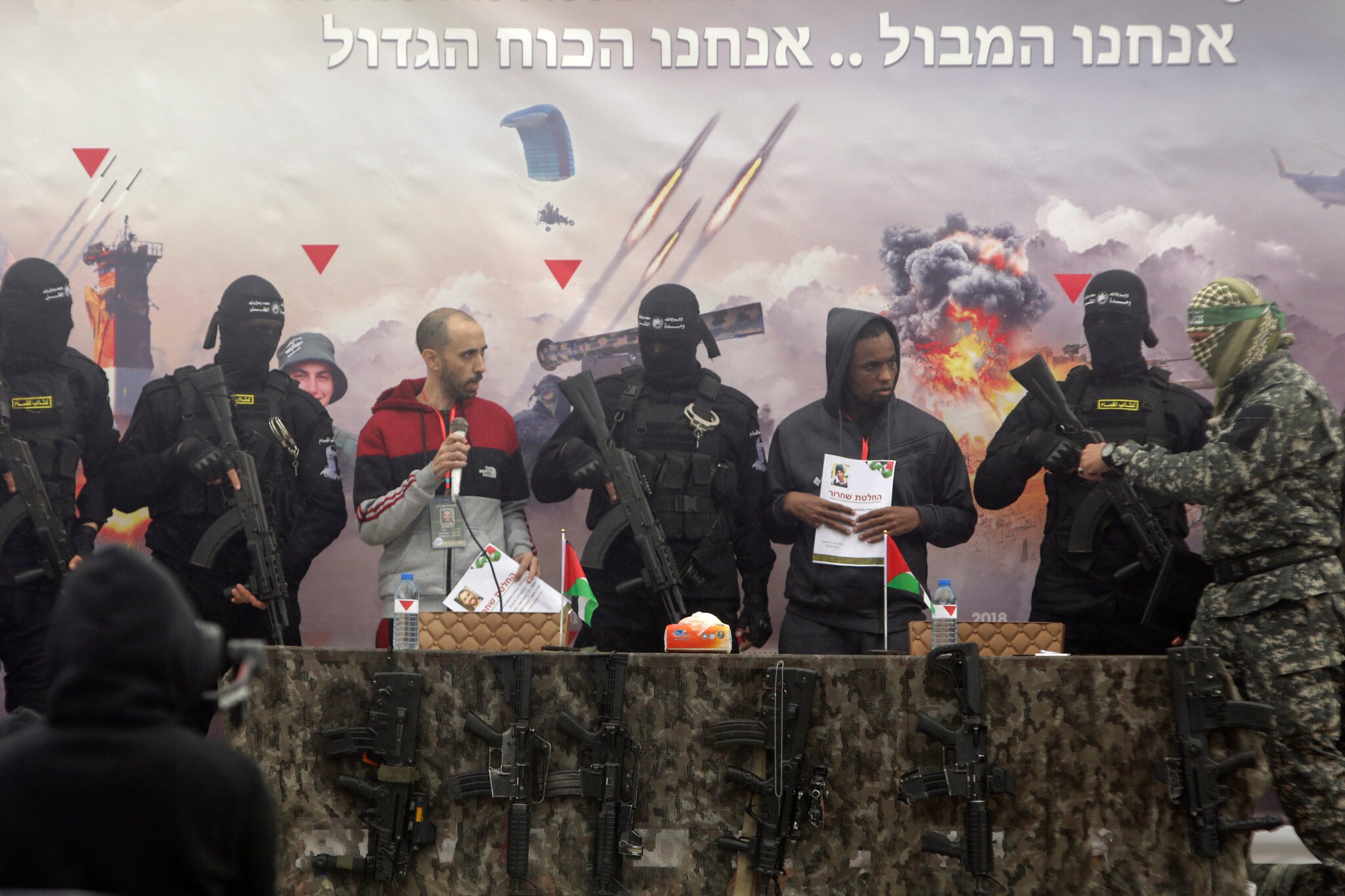
The elaborate propaganda-filled hostage-release ceremonies that Hamas has been holding throughout the first phase of the ceasefire have undercut the terror group’s chances to remain in power in Gaza, two international diplomats told The Times of Israel.
Hamas has sought to use the ceremonies to demonstrate that it remains in control of the coastal enclave after over 15 months of war with Israel. Israel and others have rejected the displays as “humiliating” and demanded they stop before any more prisoners are released in exchange for hostages.
Hostages have been paraded on stages surrounded by heavily armed masked gunmen, given “release certificates” and “gift bags,” and made to wave crowds of civilians brought in to watch the spectacle and thank their captors.
The stages have been festooned with posters of slain Hamas military leaders, and slogans vowing that the terror group would remain in control, some even mocked US President Donald Trump’s plans to relocate Gazans. Similar ceremonies have been held for the release of the bodies of slain hostages.
A senior Arab diplomat and a senior European Union diplomat speaking on condition of anonymity this week said that the performances have led the Trump administration to massively ratchet up its pressure on its Arab allies to advance a plan for the post-war management of Gaza that sees Hamas removed from power.
“This was something that the Arab states wanted before but were resigned to the fact that it wasn’t possible, given that Israel had tried to defeat Hamas for over a year and couldn’t succeed,” the EU diplomat said.
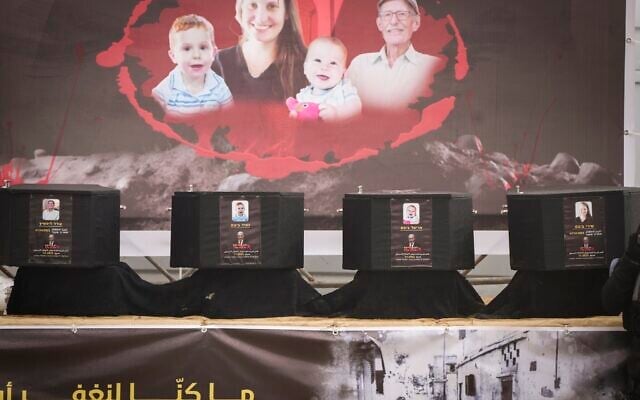
“Hamas has been sending signals that it is prepared to give up ruling Gaza. Giving up its weapons will be far more difficult, but that has been discussed in the region in recent weeks,” the senior Arab diplomat adds.
Washington’s Arab allies — led by Egypt — are putting together a plan for the post-war management of Gaza that envisions Hamas stripped of its governing power, while allowing Palestinians to remain in the Strip, contrary to Trump’s idea for the US to take over Gaza, the two diplomats said.
They acknowledged that the proposal has the same basic framework as ones discussed over the past year with the Biden administration — Arab states take part in Gaza’s security and reconstruction alongside and at the invitation of the Palestinian Authority.
But the diplomats speculated that the plan is unlikely to be implemented due to the Israeli government’s refusal to grant a Gaza foothold to the PA, which Prime Minister Benjamin Netanyahu has likened to Hamas.
This leaves an eventual return to the war as the most likely scenario, the two diplomats lamented, pointing to increasing acquiescence in Washington to that result.
The two officials credited Hamas’s hostage release ceremonies, but an Israeli official said Strategic Affairs Minister Ron Dermer’s decision last month to screen for US Mideast envoy Steve Witkoff compilation footage from Hamas’s October 7 onslaught had a profound impact on the top Trump aide.
“I’ve got some context that was important for me to have,” Witkoff said last week.
The US envoy will depart for the region in the coming days, with Israel slated to be the first stop on a whirlwind tour.
He said Sunday that his initial goal will be extending the ongoing hostage deal’s first phase.
Witkoff insisted that the second phase is still a US objective, but envisions an end to the war that Netanyahu is not prepared to accept, even in exchange for all remaining hostages.
The Trump administration is adapting to Jerusalem’s position and has already been moving away from the framework drawn up by former US president Joe Biden. Witkoff has repeatedly trashed the proposal’s third phase over its “unrealistic” five-year reconstruction timeline.
But the break from the Biden plan has extended further, with Witkoff’s decision to rework the terms of phase one.
He also appeared to alter the terms of phase two, saying Sunday that it is “much about two things — a permanent ceasefire and the fact that Hamas cannot be allowed to come back into the government.”
The publicly available annexes of the agreement make no mention of the latter idea, though, and the senior Arab diplomat said that redacted passages don’t either.
Before phase one can even be extended, Witkoff along with Arab mediators Qatar and Egypt are working to overcome an impasse regarding the stage’s last batch of releases.
Israel was supposed to free 602 Palestinian security prisoners on Saturday but refused to do so, citing Hamas’s humiliating hostage release ceremonies and the botched release of Shiri Bibas’s body.
A variety of formulas have been discussed to convince Israel to free the prisoners this week in exchange for the final four bodies of slain hostages slated for release in phase one, the Israeli official said.
Jerusalem has insisted that Hamas release the bodies before it releases the prisoners, while the terror group has thus far refused, according to the Israeli official.
The mediators have secured a commitment from Hamas not to hold a ceremony when it releases the four hostages’ bodies, although a similar assurance was given before the release of the Bibas family last week, the Israeli official revealed, adding that Hamas’s leadership abroad either didn’t want or wasn’t able to get its Gaza-based leaders on board.
While an agreement remains elusive, the Israeli official said he was optimistic that the mediators would succeed in securing a compromise.
But that only gets the sides through the end of the week, the mediators are hoping that such a deal could give momentum for a further extension through the Islamic holy month of Ramadan, which starts next week. “We’re thinking in terms of days, not weeks,” the Israeli official said.

